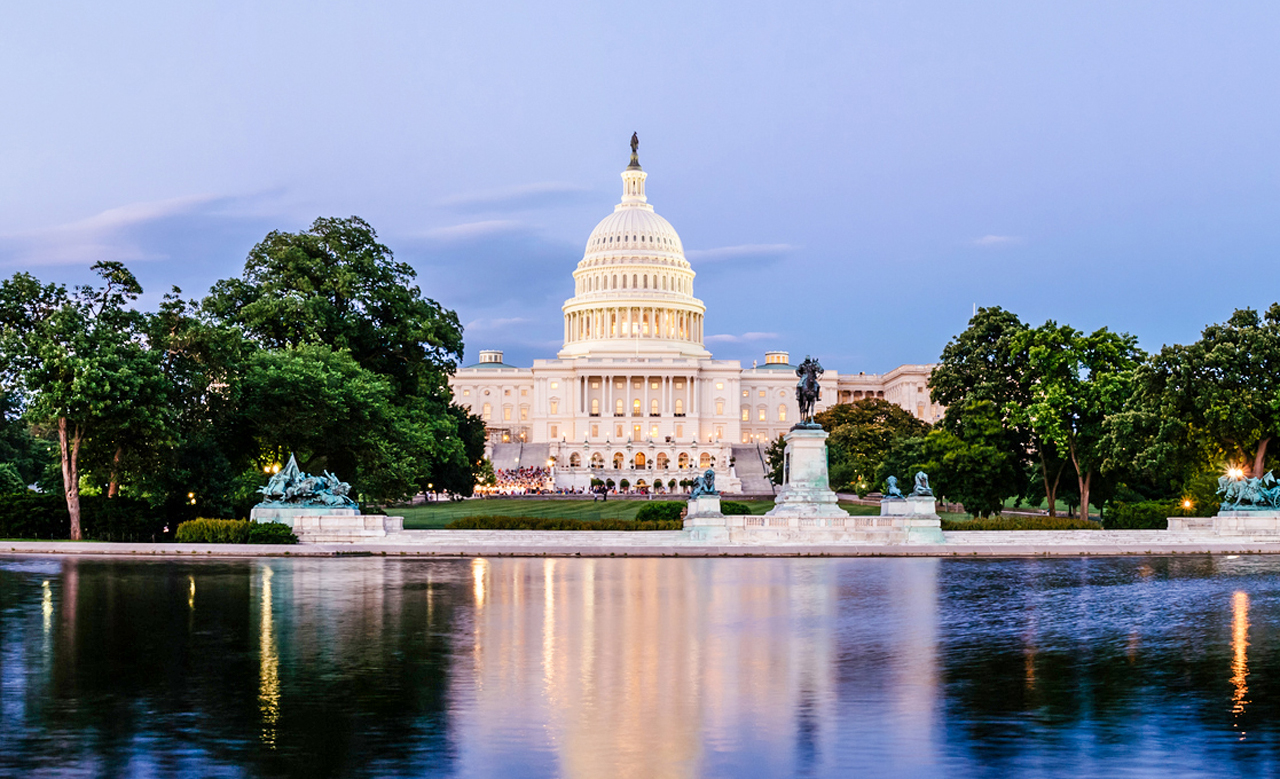Rachel Balick

Regardless of where you live, the action in Washington, DC, affects you, your patients, and your practice. Get up to speed on the latest news from federal agencies, Congress, and the White House.
DIR reform bill lands on Capitol Hill
A bipartisan group of federal legislators has introduced in the U.S. House and Senate APhA-supported legislation to reform direct and indirect remuneration (DIR) fees. The Pharmacy DIR Reform to Reduce Senior Drug Costs Act (H.R. 3554/S. 1909) would close a U.S. Department of Health and Human Services (HHS) loophole that pharmacy benefit managers (PBMs) exploit to charge pharmacies retroactive fees. Critics of the practice argue that retroactive DIR fees inflate Medicare patients’ out-of-pocket prescription drug costs and jeopardize the viability of pharmacies.
The legislation would require PBMs to treat DIR fees the same way they do other pharmacy price concessions by moving them to the point of sale. Notably, the bill would not end DIR fees altogether; however, assessing the fees at point of sale would provide pharmacies with payment transparency they need to determine their financial stability and sustainability.
Although independent pharmacies bear the brunt of the damage the unpredictable fees inflict, all pharmacies that dispense medications to Medicare Part D beneficiaries feel its effect. Pharmacies of all sizes in all communities—urban and rural—have increasingly been forced to shutter due at least in part to PBM clawbacks. Pharmacy closures deprive patients of easy access to life-changing care from their pharmacist and as the pandemic made clear, have serious public health consequences: Pharmacies have been important sites of COVID-19 testing and vaccinations. Furthermore, retroactive DIR fees offer no corresponding advantage for Part D beneficiaries. Part D plans and PBMs never use the fees they claw back to reimburse or otherwise reduce beneficiary cost sharing. That drives up out-of-pocket drug costs, which has a negative effect on adherence to medication regimens and can lead to poorer outcomes and costly hospital stays.
The federal DIR reform bill will also replace the pharmacy quality measures that plans use to extract retroactive fees, which pharmacy groups characterize as arbitrary and opaque. Instead, it will instruct CMS to standardize pharmacy performance measures. Last, it will mandate that Part D plans include suitable claim-level detail on the electronic remittance advices that accompany payment.
The bills’ primary sponsors are Reps. Peter Welch (D-VT) and Morgan Griffith (R-VA); and Sens. Jon Tester (D-MT) and Shelley Moore Capito (R-WV).
Reimbursement for COVID-19 services
On May 25, HHS announced that pharmacists can submit claims to the Health Resources and Services Administration (HRSA) to receive reimbursement for costs incurred while providing COVID-19 services to uninsured patients. This applies to services including COVID-19 vaccine administration, testing, and treatment delivered on or after February 4, 2020.
The HRSA COVID-19 Uninsured Program will reimburse pharmacists for COVID-19 services delivered to uninsured patients at Medicare rates in most cases; however, reimbursement depends on how much funding is available to the program. The program has allocated $4.8 billion for eligible claims.
Pharmacies must enroll in the program to be eligible to submit claims and will generally need to work with a medical intermediary to bill for services provided to eligible patients. The program functions like a medical benefit rather than a pharmacy benefit.
To learn more about the requirements and specifics of the HRSA COVID-19 Uninsured Program, visit apha.us/HRSAclaims.
In addition, HRSA’s new COVID-19 Coverage Assistance Fund allows pharmacists to collect reimbursement for vaccinations delivered to individuals who have insurance, but whose insurance does not cover COVID-19 services or imposes patient cost sharing.
Claims should include vaccine administration copays, deductibles, and coinsurance, and they must be submitted to the HRSA COVID-19 Coverage Assistance Fund within 365 days after the service is delivered. To submit claims, providers must create an account with the Coverage Assistance Fund Portal.
To find details and register, visit apha.us/HRSAcoverage.
Biden administration will act on drug supply chain security
On June 8, 2021, President Joe Biden announced that his administration will take immediate actions to address vulnerabilities in the pharmaceutical supply chain and enhance the safety of the nation’s drug supply. APhA has supported the administration’s efforts to protect the nation’s drug supply and to mitigate shortages of both finished drug products and active pharmaceutical ingredients (APIs).
“Our nation’s drug supply is a strategic asset, and tightening the predictability, accountability, and accessibility of essential medicines and their ingredients is essential for pharmacists to provide patient care,” said Ilisa Bernstein, PharmD, JD, FAPhA, in a media release. Bernstein is APhA’s senior vice president of pharmacy practice and government affairs.
“COVID-19 has shown us the fragility of the drug supply, and the administration’s new steps will strengthen the integrity and robustness of drug
availability in the United States.”
The June 8 announcement stemmed from a February 24, 2021, executive order, America’s Supply Chains (apha.us/EO_14017) in which Biden directed his administration to complete a review of supply chain risks within 100 days.
The June 8 declarations accompanied the release of the administration’s final report, Building Resilient Supply Chains, Revitalizing American Manufacturing, and Fostering Broad-Based Growth (apha.us/100-day_Report).
Highlights of the administration’s steps to protect and strengthen the pharmaceutical supply chain include
Ensuring essential drugs are available: establishing a public–private consortium for advanced manufacturing of medicines in the United States that will initially focus on 50 to 100 drugs on FDA’s essential medicines list
- Onshore manufacturing of APIs: investing $60 million in the domestic production of APIs
- Improving transparency: providing greater insight throughout the pharmaceutical supply chain
- Strengthening the global supply chain: working with allies and partners to decrease vulnerabilities in global supply chains
APhA has been active in efforts to ensure the integrity and security of our nation’s drug supply and plans to assist the administration in supply chain initiatives.
FTC commissioner calls for action on PBMs
Rohit Chopra, a commissioner of the Federal Trade Commission (FTC), has issued a statement calling for a crackdown on troubling PBM practices. Read the May 28, 2021, statement at apha.us/ChopraStatement.
The statement followed the release of an FTC report on “rebate walls,” a practice in which drug manufacturers pay PBMs to include their products in health plan formularies and to exclude competitors from those formularies. FTC created the report per an order from Congress. Read it at apha.us/RebateWalls.
“FTC and Congress must take concrete steps to address the conflicts of interests embedded in the structure of the PBM industry,” Chopra said. “In addition to problematic rebating practices, we must also examine whether PBMs are engaged in coercive practices that harm patients, independent pharmacists, and public health.”
He also recommended that FTC “conduct rulemakings that specify when certain pharmaceutical industry practices, such as PBM rebating, are unlawful under Section 5 of the Federal Trade Commission Act.”
In addition, Chopra acknowledged that FTC has routinely undermined state efforts to stop PBM abuses.
APhA noted in a member newsletter that it has met with Chopra several times to present concrete examples of abusive PBM business practices. “We will continue to work directly with FTC to recommend options the agency can pursue to address vertically merged PBMs’ ‘unfair methods of competition,’ which continue to harm our nation’s pharmacies and patients.”
DIR fees doubled between 2017 and 2019
A CMS budget report the agency submitted to Congress contained a bombshell revelation: Pharmacy DIR fees grew by 91,500% between 2010 and 2019.
HHS—which introduced the loophole that opened the door for the runaway fees but has done nothing to close it—had previously reported that pharmacy DIR fees rose 45,000% between 2010 and 2017.
That means the fees doubled in just 2 years.
More news from the Hill

APhA has officially endorsed legislation that would explore cost savings associated with investment in preventive health services. The Preventive Health Savings Act (S. 1685) was introduced by Sen. Ben Cardin (D-MD).
The bill would define preventive health as “an action designed to avoid future health care costs that is demonstrated by credible and publicly available epidemiological projection models, incorporating clinical trials or observational studies in humans, longitudinal studies, and meta-analysis.” If enacted, the legislation would allow the Congressional Budget Office to make estimates that more accurately reflect how much preventive health care would reduce health care costs.
It would also allow leaders of relevant congressional committees to request an analysis of preventive measures that extends the current 10-year window for two additional 10-year periods.
Making it easier for you
APhA has created a resource that guides pharmacies as they pursue reimbursement under the two HRSA programs. Access the resource at apha.us/HRSA_APhAguide.